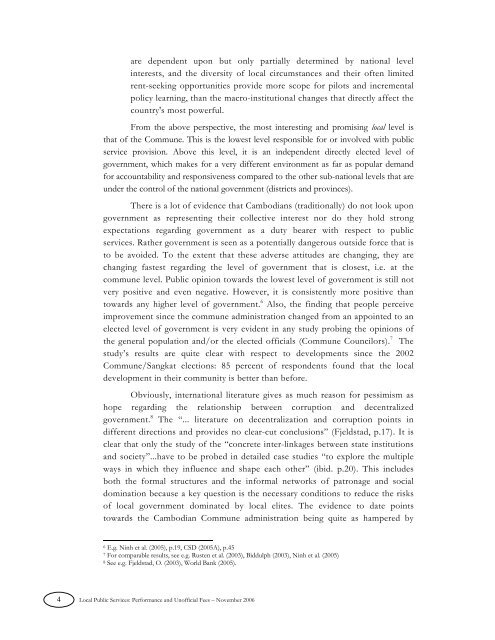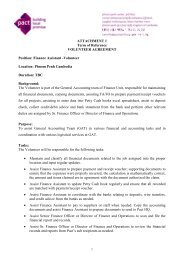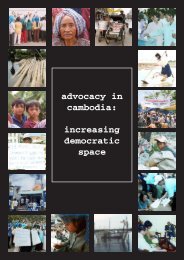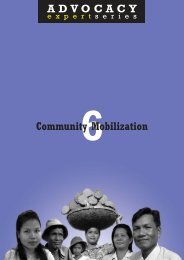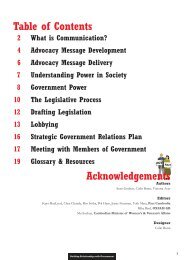Local Public Services Performance and Unofficial ... - Pact Cambodia
Local Public Services Performance and Unofficial ... - Pact Cambodia
Local Public Services Performance and Unofficial ... - Pact Cambodia
You also want an ePaper? Increase the reach of your titles
YUMPU automatically turns print PDFs into web optimized ePapers that Google loves.
are dependent upon but only partially determined by national level<br />
interests, <strong>and</strong> the diversity of local circumstances <strong>and</strong> their often limited<br />
rent-seeking opportunities provide more scope for pilots <strong>and</strong> incremental<br />
policy learning, than the macro-institutional changes that directly affect the<br />
country's most powerful.<br />
From the above perspective, the most interesting <strong>and</strong> promising local level is<br />
that of the Commune. This is the lowest level responsible for or involved with public<br />
service provision. Above this level, it is an independent directly elected level of<br />
government, which makes for a very different environment as far as popular dem<strong>and</strong><br />
for accountability <strong>and</strong> responsiveness compared to the other sub-national levels that are<br />
under the control of the national government (districts <strong>and</strong> provinces).<br />
There is a lot of evidence that <strong>Cambodia</strong>ns (traditionally) do not look upon<br />
government as representing their collective interest nor do they hold strong<br />
expectations regarding government as a duty bearer with respect to public<br />
services. Rather government is seen as a potentially dangerous outside force that is<br />
to be avoided. To the extent that these adverse attitudes are changing, they are<br />
changing fastest regarding the level of government that is closest, i.e. at the<br />
commune level. <strong>Public</strong> opinion towards the lowest level of government is still not<br />
very positive <strong>and</strong> even negative. However, it is consistently more positive than<br />
towards any higher level of government. 6 Also, the finding that people perceive<br />
improvement since the commune administration changed from an appointed to an<br />
elected level of government is very evident in any study probing the opinions of<br />
the general population <strong>and</strong>/or the elected officials (Commune Councilors). 7 The<br />
study’s results are quite clear with respect to developments since the 2002<br />
Commune/Sangkat elections: 85 percent of respondents found that the local<br />
development in their community is better than before.<br />
Obviously, international literature gives as much reason for pessimism as<br />
hope regarding the relationship between corruption <strong>and</strong> decentralized<br />
government. 8 The “... literature on decentralization <strong>and</strong> corruption points in<br />
different directions <strong>and</strong> provides no clear-cut conclusions” (Fjeldstad, p.17). It is<br />
clear that only the study of the “concrete inter-linkages between state institutions<br />
<strong>and</strong> society”...have to be probed in detailed case studies “to explore the multiple<br />
ways in which they influence <strong>and</strong> shape each other” (ibid. p.20). This includes<br />
both the formal structures <strong>and</strong> the informal networks of patronage <strong>and</strong> social<br />
domination because a key question is the necessary conditions to reduce the risks<br />
of local government dominated by local elites. The evidence to date points<br />
towards the <strong>Cambodia</strong>n Commune administration being quite as hampered by<br />
6 E.g. Ninh et al. (2005), p.19, CSD (2005A), p.45<br />
7 For comparable results, see e.g. Rusten et al. (2003), Biddulph (2003), Ninh et al. (2005)<br />
8 See e.g. Fjeldstad, O. (2003), World Bank (2005).<br />
4 <strong>Local</strong> <strong>Public</strong> <strong>Services</strong>: <strong>Performance</strong> <strong>and</strong> <strong>Unofficial</strong> Fees – November 2006


